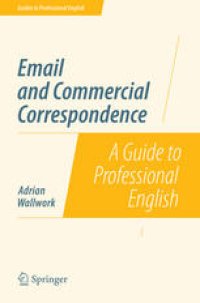
Ebook: Email and Commercial Correspondence: A Guide to Professional English
Author: Adrian Wallwork (auth.)
- Genre: Linguistics // Foreign: English
- Tags: Careers in Business and Mangagement, Popular Science general
- Series: Guides to Professional English
- Year: 2014
- Publisher: Springer-Verlag New York
- Edition: 1
- Language: English
- pdf
If you write emails and letters as part of your work, then this book is for you. By applying the suggested guidelines, you will stand a much greater chance of getting the desired reply to your emails in the shortest time possible.
Some of the key guidelines covered include:
- Write meaningful subject lines - otherwise recipients may not even open your mail.
- Always put the most important point in the first line - otherwise the reader may not read it.
- Be concise and only mention what is truly relevant. Write the minimum amount possible - you will also make fewer mistakes!
- Be a little too formal than too informal - you don’t want to offend anyone.
- If you have two long important things to say, say them in separate emails.
- Give clear instructions and reasonable deadlines.
- If you need people to cooperate with you, it is essential to highlight the benefits for them of cooperating with you.
- Empathize with your recipient's busy workload.
- Never translate typical phrases literally - learn equivalent phrases.
The book concludes with a chapter of useful phrases. There is also a brief introduction for trainers on how to teach Business / Commercial English.
If you write emails and letters as part of your work, then this book is for you. By applying the suggested guidelines, you will stand a much greater chance of getting the desired reply to your emails in the shortest time possible.
Some of the key guidelines covered include:
- Write meaningful subject lines - otherwise recipients may not even open your mail.
- Always put the most important point in the first line - otherwise the reader may not read it.
- Be concise and only mention what is truly relevant. Write the minimum amount possible - you will also make fewer mistakes!
- Be a little too formal than too informal - you don’t want to offend anyone.
- If you have two long important things to say, say them in separate emails.
- Give clear instructions and reasonable deadlines.
- If you need people to cooperate with you, it is essential to highlight the benefits for them of cooperating with you.
- Empathize with your recipient's busy workload.
- Never translate typical phrases literally - learn equivalent phrases.
The book concludes with a chapter of useful phrases. There is also a brief introduction for trainers on how to teach Business / Commercial English.
Adrian Wallwork is the author of over 30 books aimed at helping non-native English speakers to communicate more effectively in English. He has published 13 books with Springer Science+Business Media.
Other books in this Professional English series:
CVs, Resumes, and LinkedIn
User Guides, Manuals, and Technical Writing
Meetings, Negotiations, and SocializingPresentations, Demos, and Training Sessions
Telephone and Helpdesk Skills